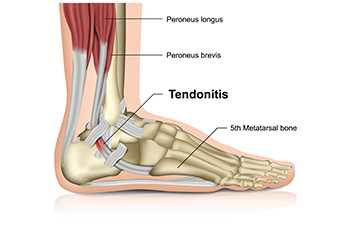
Achilles tendon injuries, though often underestimated, can be a formidable adversary in the realm of physical well-being. When the Achilles tendon, the largest one in the human body, succumbs to strain or trauma, a cascade of challenges unfolds. Expect a journey of patience and resilience as healing time can vary, requiring a delicate balance of rest and rehabilitation. The onset may start as a sudden sharp pain or a gradual ache, demanding attention to avoid making it worse. Mobility may be compromised, necessitating a change in daily activities. As the healing process unfolds, anticipate the gradual return to normalcy, guided by a comprehensive rehabilitation plan. Embrace the process, as understanding and managing expectations become vital companions on the path to recovery from Achilles tendon injuries. If you have endured an Achilles tendon injury, it is strongly suggested that you consult a podiatrist who can customize an appropriate treatment plan for you.
Achilles tendon injuries need immediate attention to avoid future complications. If you have any concerns, contact Patrice Antero, DPM of Tuscany Podiatry. Our doctor can provide the care you need to keep you pain-free and on your feet.
What Is the Achilles Tendon?
The Achilles tendon is a tendon that connects the lower leg muscles and calf to the heel of the foot. It is the strongest tendon in the human body and is essential for making movement possible. Because this tendon is such an integral part of the body, any injuries to it can create immense difficulties and should immediately be presented to a doctor.
What Are the Symptoms of an Achilles Tendon Injury?
There are various types of injuries that can affect the Achilles tendon. The two most common injuries are Achilles tendinitis and ruptures of the tendon.
Achilles Tendinitis Symptoms
- Inflammation
- Dull to severe pain
- Increased blood flow to the tendon
- Thickening of the tendon
Rupture Symptoms
- Extreme pain and swelling in the foot
- Total immobility
Treatment and Prevention
Achilles tendon injuries are diagnosed by a thorough physical evaluation, which can include an MRI. Treatment involves rest, physical therapy, and in some cases, surgery. However, various preventative measures can be taken to avoid these injuries, such as:
- Thorough stretching of the tendon before and after exercise
- Strengthening exercises like calf raises, squats, leg curls, leg extensions, leg raises, lunges, and leg presses
If you have any questions please feel free to contact our office located in Tuscaloosa, AL . We offer the newest diagnostic tools and technology to treat your foot and ankle needs.



